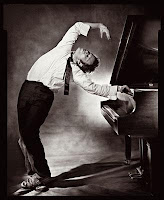 So, here we are, 50-odd years later, and Tom Waits has made a career out of distorting the world in an often disturbing way. His songs often sound like they have been bashed out of shape, put through a wringer, then left to dry in the sun until they are parched and somehow pure of spirit.
So, here we are, 50-odd years later, and Tom Waits has made a career out of distorting the world in an often disturbing way. His songs often sound like they have been bashed out of shape, put through a wringer, then left to dry in the sun until they are parched and somehow pure of spirit.Waits talks like he sings, in a rasping drawl and with an old-timer's wealth of received wisdom. It's as if, in late middle-age, he has grown into the person he always wanted to be. His tales are often tall, and his metaphors and similes tend towards the surreal. 'Writing songs is like capturing birds without killing them,' he quips. 'Sometimes you end up with nothing but a mouthful of feathers.'
Way back, when I first stumbled on Tom Waits while rooting though a friend's record collection, every song seemed to be about drinking and losing your way in the fog. His first record was even called 'Closing Time', but it sounded more like a lock-in at the loneliest bar in the world. Just Tom in the corner slumped over the piano serenading the last few nighthawks with his slurred songs about heartaches and hangovers, and the girl that got away.
His persona had already been perfected by the time he started living in the Tropicana Motel in Los Angeles in 1975, a faded establishment that also housed a couple of aristocratic junkies and several call girls who worked Sunset Strip. For six albums on Asylum Records, from his aforementioned debut in 1973 to 1980's Heartattack and Vine, Waits was the gravel-voiced, beer-stained bard of the barstool, a latter-day beatnik with a bad liver and a broken heart, whose fans were few and far between, but utterly devoted. And, boy, did he pay his dues.
For a long while, it looked like Waits would remain a cult figure, out on the furthermost horizon of the Seventies music scene, a stumblebum troubadour raised on bourbon and Bukowski. His music suggested and, to a lesser degree, still suggests, that the Sixties utterly passed him by; that, in his self-contained universe, the Beats were far more important than the Beatles, and Sinatra took precedence over the Stones.
'You imitate what you grow up around,' he says, when I mention this. 'If you grow up around Sinatra, Crosby and Louis Armstrong as a kid, it goes in and stays in. But some of that Sixties stuff went in too.'
He pays homage to them one more time on Orphans, singing Kerouac's forlorn road song 'Home I'll Never Be', and reciting Bukowski's beautiful poem 'Nirvana', both, in their own way, odes to rootlessness, restlessness, the fleeting, irrevocable moment when things could have been different. The essence, in fact, of a good many Tom Waits songs. Why, I ask, were the Beats so crucial to him?
'They were father figures,' he says softly, his long fingers tracing small circles in the coffee spill on the table. 'They were the ones I looked to for guidance. See, my dad left when I was 10, so I was always looking for a dad. It was like, "Are you my dad? Are you my dad? What about you? Are you my dad?" I found a lot of these old salty guys along the way.'
In 1978, Waits met Kathleen Brennan whom has become his wife and saved his life.
Kathleen was the catalyst for the dramatic sea-change in Waits's music that occurred with the release of Swordfishtrombones in 1983. 'I didn't just marry a beautiful woman,' he says, 'I married a record collection.' When Waits was once asked what his wife brought to the table, he replied, 'Blood and liquor and guilt.' Which is handy, because Waits himself hasn't had a drink for 14 years. When he says that Kathleen saved his life, he means it literally.
Does he miss the odd night-cap? 'Miss drinking?' he says, sounding genuinely surprised. 'Nah. Not the way I was drinking. No, I'm happy to be sober. Happy to be alive. I found myself in some places I can't believe I made it out of alive.' That bad, huh? 'Oh yeah. People with guns. People with gunshot wounds. People with heavy drug problems. People who carried guns everywhere they went, always had a gun. You live like that,' he says, without a trace of irony, 'you attract lower company.'
I ask if he wrote a different kind of song when he was drinking. He thinks about this for an instant, then says, 'No. I don't think so. I mean, one is never completely certain when you drink and do drugs whether the spirits that are moving through you are the spirits from the bottle or your own. And, at a certain point, you become afraid of the answer. That's one of the biggest things that keeps people from getting sober, they're afraid to find out that it was the liquor talking all along.'
'I was trying to prove something to myself, too,' he says, revealingly. 'It was like, "Am I genuinely eccentric? Or am I just wearing a funny hat?" All the big questions come up when you get sober. "What am I made of? What's left when you drain the pool?"'
Read the full article...
No comments:
Post a Comment